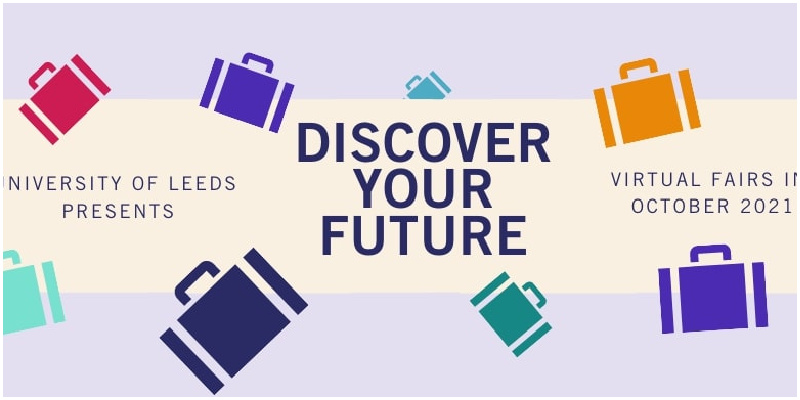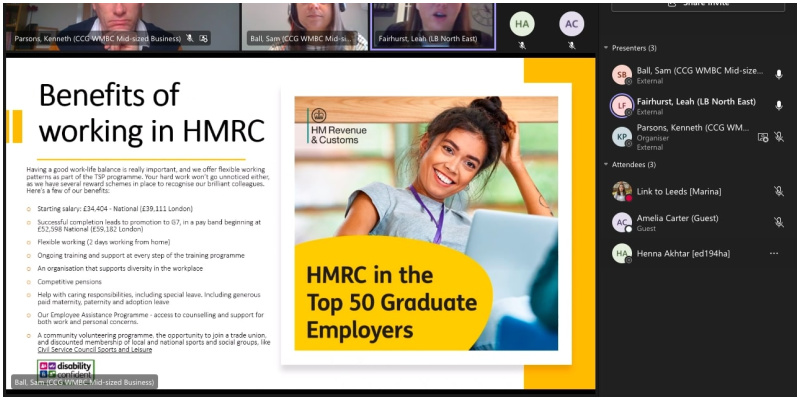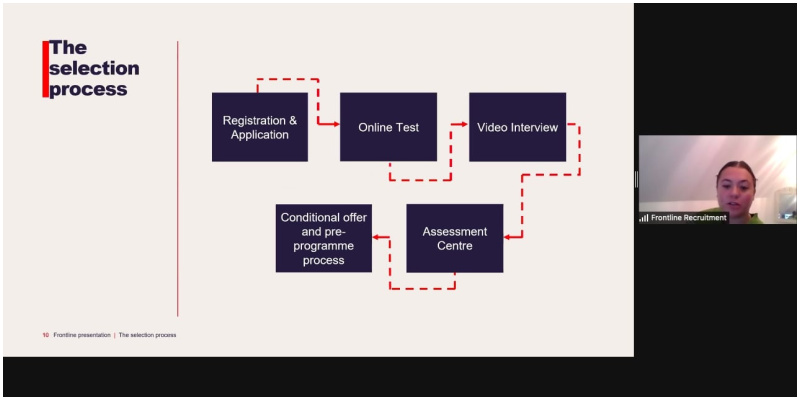Virtual Careers Fairs: Government, Education and Non-Profits

On the 19th of October we participated in one of the Virtual Careers autumn series “Discover Your Future” focusing on the Third Sector - Government, Education and Non-Profits. According to our personal interests, we decided to take part in group and 1-to-1 meetings presented by the Civil Service Fast Stream, Local Government Association (National Graduate Development Programme - NGDP), HMRC, Teach First and Frontline.
The Careers Centre at the University of Leeds offers students various support throughout their studies – from how to find a job and gain some valuable work experience to booking 1-to-1 CV appointments with professionals and contact with the global alumni network. The Virtual Career Fairs are a great way of being exposed to and interacting with the best of the industry, from the comfort of virtual screens.

Lia
- Civil Service Fast Stream Graduate Programme
Catriona Logan, Jenna Richmond, and Jai Shailer – all former University of Leeds students from different academic backgrounds who are now current “Fast Streamers”. They shared some insights of the organisation, what it means to be part of an “award-winning graduate leadership development programme” and to build a rewarding career. The motto “The Fast Stream: You, Unlimited” makes an impression and presents one of the most important values – offering an inclusive and collaborative environment to everyone and proudly being a Disability Confident Leader. Assistance can be offered to anyone who needs it, so that the best performance is guaranteed even throughout the initial application process.
Offering 15 different graduate schemes with a duration between 2-4 years and a potential to be promoted to a senior position afterwards, this graduate opportunity supports students from all backgrounds to engage with a career which has a real positive impact on issues that matter. By getting to experience a wide range of roles throughout the scheme, you can benefit from getting out of your comfort zone, having the chance to find your genuine passion and meet like-minded people.
Some facts about the application process
- During the application process, students can choose up to 4 schemes – if they have been shortlisted, they will be expected to accept their first choice. This is way it is important to put choices in order of preference and families yourself with all the requirement and expectation from each scheme in advance.
- Steps include online application form, multiple choice online tests, online work-based scenarios, final selection board (apart from HR, Commercial, Generalist, Finance), assessment centre, and finally a pre-recorded video interview
- Many of the schemes accept a final grade of 2:2 (details on their website)
- A CV is seen as anecdotal evidence – what matters the most is your potential, what person you are and how to present it while being authentic.
- It is of great significance to focus on your own application process! Everyone finds out about the outcome of their application at a different time, so it is important to focus on yourself and follow how you can cover what the organisation is looking for in their candidates.
On their website you can find detailed information regarding each scheme, the requirements, and the various career options afterwards! The deadline to apply is in a few days but don’t worry, because Fast Stream accepts candidates from various age groups each year. What is most important – be authentic and start preparing in advance, so that you have enough time to make the right choice for you!
- NGDP – Local Government Association
“Reducing homelessness. Protecting the environment. Caring for vulnerable children. Regenerating areas characterised by crime and poverty.”
A local government is led by councillors elected by the public - around 1 million people working there, 343 councils in England and more than 800 different services. These include adult and children social care, domestic violence, crime reduction, public health, economic development, communications and media, etc. The graduate scheme offers a 2-year contract with a local authority and a minimum of 3 different placements across council services and more than 50 council to choose from. The learning programme is fully funded and includes a certificate in Leadership & Management. What could your career after the NGDP look like? Fast track to senior positions and wide variety of different public sector roles – 9 out of 10 trainees secure a permanent role within 1 year of completing the scheme.
Some of the example placements which Meli Stanley (Public Health Officer) presented included: working with schools to develop a cultural and creative education strategy for the area, developing performance monitoring frameworks for the senior management team, working in the regeneration team to create an offer from the council to support budding local social authorities, setting up a scheme that supports young people in care.
Some of the entry requirements include a minimum of a 2:2 undergraduate degree in any discipline, right to work in the UK and to be a passionate individual who thinks outside of the box and wants to make a difference in communities. If you want to have a tangible impact and combine challenging work with support, then you should check out NDGP’s website - there you can find some key application dates, skills and behaviours which the schemes requires, an “Equality, Diversity and Inclusion” review and browse the most suitable opportunities for you!
Marina
The sessions I attended were by HM Revenue and Customs Department (HMRC), Teach First and Frontline.

3. HMRC: My day started with attending the session on UK’s central body for tax and customs, HMRC. The presentation was led Kenneth Parsons, an associate at the organisation and a former student of the University of Leeds. The presentation, which really well-made and impressive, explained about the various sectors that function under HMRC like international trade and customs, budget policy or even international crime and fraud. Eventually, an applicant will find their niche and settle in a particular department.
HMRC believes in nurturing ethics like tackling complex work, skills like leadership, team management and communication among its staff. But the main highlight of the organisation was the Tax Specialist Programme (TSP), designed for graduates. The programme ranges from 3.5-4 years and involves roles like negotiating tax disputes, representing HMRC in tribunal, investigating fraud, consultant for businesses, among others. The programme is designed to give the one all the skills that they would require to be a tax specialist. There are 13 centres of the HMRC, across the UK including in Leeds.
There are three major areas of the TSP-studying, casework and professional standards. The training is delivered by the HMRC in-house tax academy. The studying part is divided on the basis of modules and online tutorials. When it comes to casework, it allows one to put into practice, the content of the study material. It involves a range of activities like talking to customers over the phone, visiting an accountants office, reviewing tax records and accounting practices, and others. However, the major part of the course is professional standards, where one write, reflect and taking tactical professional decisions.
The presenters assured there is a lot of scope for promotion. One of the main aspect is the salary, which goes on a Grade 7 rank towards the end of TSP. For undergraduates it gives the comfort of studying and working at the same time.
The application process works in three stages:
- Three sets of online tests
- a pre-recorded online interview
- a half day assessment at a centre
HMRC does not look for a particular degree or experience. The main agenda is to find people are are natural analytical thinkers and are team players. However, one needs to have the right to work in the UK under their visa rights.
For an official organisation like HMRC, their presentation seemed really welcoming and inviting for international students.
4. Teach First
Teach First is a UK based charity organisation that trains individuals to become teachers and get employed in schools across the country. The programme for fresh graduates involves them working in different sectors. The aim of working in different sectors is to see which one works for the individual applicant.
In terms of what age you will be qualified for application, there is no bar unless one is eligible for the position they are applying for. For example, if an applicant studies a subject that is eligible for teaching secondary, one can most probably start with secondary but they also apply for early spaces.
Teach First offers positions in anything from primary to right to the end of secondary. If you teaching secondary, it is usually 7-11 but it would sometimes include A levels. However, Teach First assures that they will always make sure that you are comfortable before asking you to take additional roles like that.
Sixth form is not included in teaching or training. The reason for this is because Teach first wants to make sure that one is fully comfortable with the curriculum knowledge, before they teach sixth form. However after the two years of training, one can teach sixth form.
In regards to growth in career, progression into senior leadership happens very soon. Since 2003, Teach First has inducted 93 head teachers, 4,000 senior and middle leadership employees and many more in key roles. Teaching begins from Day 1, as the training gives skills for progression very fast.
Moreover, for those who are interested in the field of teaching yet unsure about what entails, there are Taster programmes. Through this programme, the graduate will be exposed to to the work ethics of Teach First.
5. Frontline

Frontline is a social charity organisation that is driven by the mission to provide safe homes for homeless children across the UK. You start your journey in Frontline by working with the local authority. The placement with a local authority begins in September and fulfil two years in the programme, post which one will work with real families and children, forming a unit. To define it, a unit is a group of four including the applicate and two others in the same positions, being managed by a social worker.
Recall days including lectures, teachings, seminars etc., and end number of practice sessions with your tutor. In Year 1, there are 200 days of job training and the rest is academic learning. Year 2 is when you will become a qualified social worker and manage a case load of your own in support with local authorities.
The salary for applicants in first year is £22,500- £25,000 salary, depending on whether you work in London or out of it. In Year 2, one earns a salary as a legitimate social worker up to £25,000- £34,000.
Moreover, there is the Fellowship program, which is driven by- practice, innovation and quality. Competency and commitment to children and families is what Frontline generally looks for in their ideal candidate, along with an excellent academic track record.
All in all, these two sessions made me realise how the non-profit organisations like TeachFirst and Frontline are working marvellously, and doing their best to provide facilities to the less fortunate.
Attending the career fairs on Government, Education and Non-Profits gave us a new perspective on how these organisations are as an industry and what they look for, in potential applicants. If one has to go on their own to attend such seminars, it would certainly take a lot of effort. Therefore, having these companies as a part of the career fair is a bonus for students and the employing companies alike.
